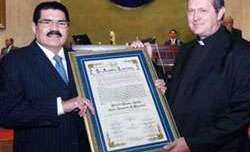When Steven Lennon was in first grade he used to wake up early before school. His family lived a stone’s throw away from Annunciation Church in Ilion, N.Y., and Steven would run over each morning—hoping the altar boy hadn’t shown up so that he’d be able to help the priest serve Mass.
Now 31, Steven worships these days in Auburn Correctional Facility, a maximum security prison about 30 miles southwest of Syracuse. He is serving a 15 years-to-life mandatory sentence for possession of a small amount of cocaine.
Since Steven was locked up in 1984, holidays have been a painful time for the Lennons. But this year is different: The family has reason to believe that this might be the last Christmas that Steven will have to spend behind bars.
 In February 1992, Steven will be eligible to ask Gov. Mario Cuomo to grant him “executive clemency.” Thus far, he and his family have collected 3,000 signatures and letters from supporters who feel that Steven has paid his debt to society and should be allowed to go free.
In February 1992, Steven will be eligible to ask Gov. Mario Cuomo to grant him “executive clemency.” Thus far, he and his family have collected 3,000 signatures and letters from supporters who feel that Steven has paid his debt to society and should be allowed to go free.
“I should have another chance at freedom,” Steven maintained in a phone interview from prison.
In his seven plus years in jail, he has hardly been idle. He has earned a bachelor’s degree in business and graduated as valedictorian of his class of inmates. Right now, he’s working towards a certificate in architectural drafting. He started the prison’s first substance abuse program and has been in charge of the mess hall for prison guards and staff for the past five years.
“He is an excellent inmate,” acknowledged James Festa, correction counselor at the jail. “He’s done what he needed to do at the facility; he’s gone above and beyond what is required of an inmate.”
‘Difficult’ Case
Steven was convicted under the so-called Rockefeller drug-sentencing laws, passed in the 1970s to combat heroin trafficking and now considered to be among the nation’s harshest and most unforgiving.
And both the attorney who prosecuted him and the judge who sentenced him are on the record as saying that they would support his release.
Franklin County Assistant District Attorney Jeremiah Hayes said in an interview that the case was “difficult” because of Steven’s age (he was 24 at the time of his arrest) and the fact that it was his first run-in with the law.
Steven and a friend had been pulled over on suspicion of drunk driving in the Saranac Lake region. A search of their rented car later turned up a little more than four ounces of cocaine.
Four ounces doesn’t sound like much, but under the 1973 legislation backed by then-Gov. Nelson Rockefeller, possession of four ounces or more of a “controlled substance” like cocaine or heroin is an “A-1 felony”—subject to a mandatory penalty of 15 years-to-life. Under the law, judges have no discretion to tailor their sentences to individual circumstances.
“It’s a tough law, no doubt about it,” said Hayes. The law limits the sort of pre-trial plea bargains that prosecutors can offer to suspects, but Hayes said that he offered Steven the best deal he could—a minimum sentence of three years-to-life.
The Lennons spurned that offer, gambling that a jury would acquit him based on certain irregularities in the way Tupper Lake police officers had handled his arrest. “They elected to go to trial and lost, and the penalties were severe,” said Hayes.
The Lennons say that they rejected the offer because they were scared of Steven having to serve any time in prison and because their lawyers had convinced them that the case against Steven would be thrown out of court.
“We never believed that somebody could get that kind of sentence the first time they were ever arrested,” said Steven’s mother, Shirley Lennon. “We never said that we didn’t think that he shouldn’t be punished. But it’s the degree of punishment that we object to: it’s so unfair.”
Steven and his family have had seven long years to think about his crime and their strategic mistake in rejecting the prosecutor’s offer.
“The hardest thing about prison is that you never have a chance to be alone,” Steven said. “You live in a six-by-eight cell and you’re always around people; you’re never alone.”
Growing Up
Despite the hardships, Steven says he has “grown up” while living with 1,700 of New York’s most notorious and violent criminals. He came in, he says, a “pretty wild kid,” and today is a chastened, reflective adult. “When you hit the bottom, you have to look up,” he said. “When you see there’s no one there to give you the hand you need, you turn to your religion. You have to believe in something to survive in here. For most of the guys, it’s either hatred or God. For me, it’s God.”
His family too has been bolstered by their religious faith.
“There was a time when I couldn’t think about him without crying,” said his sister, Joanne Perras, a hospice nurse who works in Cape Cod, Mass. “But I can truthfully say I never lost faith. I always knew that God was doing this for a reason. If he didn’t get that sentence, maybe Steven wouldn’t have learned what life is really about.”
Shirley Lennon serves as a Eucharistic minister at Annunciation Church. She said that the heartache and worry has brought her closer to God and brought her family closer together.
But, seven years ago, it was a quite different story.
“It seemed like our lives truly ended,” she recalled. “We went to see our priest, who at that time was Father (J. Gregory) Mulhall. We told him we didn’t even know what to pray for, and he told us never to give up hope. We couldn’t have gotten through without him and the Church. We need the Church and God desperately.”
The Lennons are still receiving moral support from the Church. Most recently, they’ve gained the backing of Rev. R. Adam Forno, associate pastor of St. Francis de Sales Church in Loudonville, N.Y.
Father Forno learned of Steven’s predicament from Perras when the two worked together at a local hospice where he served as a chaplain. He began exchanging letters with Steven and has visited him in the jail. He’s convinced that Steven has learned his lesson and that he and his family have suffered enough.
“To talk with Steven and to hear his story, you know he has a great deal of remorse and that his punishment has outweighed his crime,” said Father Forno. “It is touching and genuine how this whole incident has changed the lives of everyone in the family and brought them closer together. They have really been able to put it in a faith perspective, and bring life and hope out of this devastating situation.”
Father Forno is collecting letters of support for Steven which will be presented to Gov. Cuomo when Steven appeals for clemency in late February. He’s hoping to rally Catholics in the Albany Diocese to support one of their own.
“As Catholics, we’re conscious that we all sin and make mistakes,” he explained. “But he has redeemed himself through his punishment and has himself become a redeeming force—working to help others affected by drugs and alcohol.”
Shirley Lennon is aware that her son’s chances for release could be diminished by public demand for stiffer penalties for criminals.
“It’s different from a mother’s view than it is from the public view,” she maintained. “A lot of people feel that, if you’ve done something wrong, you deserve to go to jail and anything is too good for that person. I used to feel that way until it was my own son. He never hurt anyone. Unless you’ve really done something bad, you don’t need to be there for life.”
For his part, Steven seems serene about the prospects for his freedom. He knows that, if his clemency bid fails, he won’t be eligible for parole until 1999. Still, he remains hopeful.
“I’d do more for society on the streets than behind these walls,” he said. “I’ve contemplated my past and I don’t wish to regress back to those days. I’ve got better places to go. And I know I’ll go there, eventually. I’ll never be back in jail again.”
First published in The Evangelist (December 19, 1991)
© David Scott, 2009. All rights reserved.


